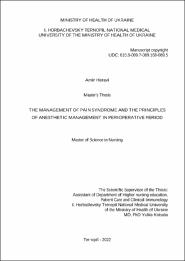THE MANAGEMENT OF PAIN SYNDROME AND THE PRINCIPLES OF ANESTHETIC MANAGEMENT IN PERIOPERATIVE PERIOD
Abstract
The study of such subjective symptom as pain does not have an unambiguous interpretation by different people. When defining the criteria for a good surgical outcome, most surgeons agree that pain relief is the main parameter that determines an outcome as "good". However, it is difficult to assess which improvement on an visual analog scale corresponds to a clinically meaningful improvement. Positive changes in performance status, activities of daily living and returning to work are the second most frequently mentioned criteria for a positive outcome.
Therefore, the purpose of this project is studying and assessment of pain syndrome as one of the main criteria in surgical studies.
This study consisted of patient observation and data analysis. In the first part of the research work, we have conducted a study and analysis of the number of patients with various diseases who have had surgical interventions and determined the intensity of pain syndrome on the second day after the operation. In this part of the research work, 87 patients were enrolled. In the second part of the research work, we have conducted a comparison of the intensity of pain syndrome in patients of various surgical profiles. As a next step, we have conducted data analysis, comparisons and data summarization with inferencing.
A large number of scheduled surgeries allow predicting the likelihood of expected moderate to severe pain in patients who have experienced a pain of such intensity in our study. However, not enough preventive measures have been taken to avoid the onset of pain.
As a result of the research, the authors analyzed specific aspects of pain syndrome and the principles of its management in nursing practice; the main methods and principles of pain control in the patients; determined the principles for preparation of patients with pain syndrome to surgical procedures; studied the characteristic features of anesthetic management of surgical patients with various disease; investigated the potential anesthesia-related complications after the surgery; conducted comparison and analysis of pain intensity in the postoperative period of patients with various orthopedic, cardiosurgical, general surgical and gynecological diseases.
It should be pointed out that the follow-up of pain is a very important aspect of anesthesiological nursing practice, since it may greatly relieve the suffering of the patients, and improve their quality of care and quality of life during their hospital stay.

